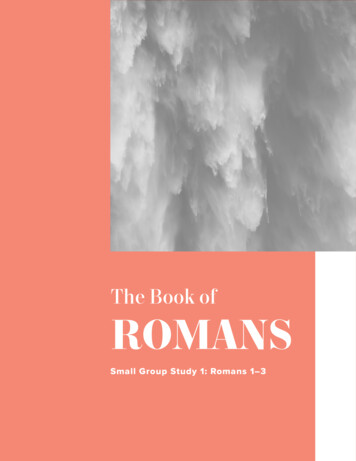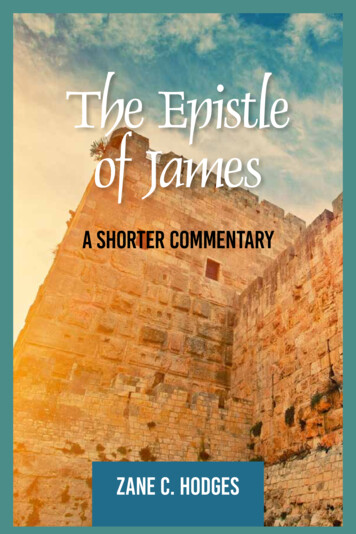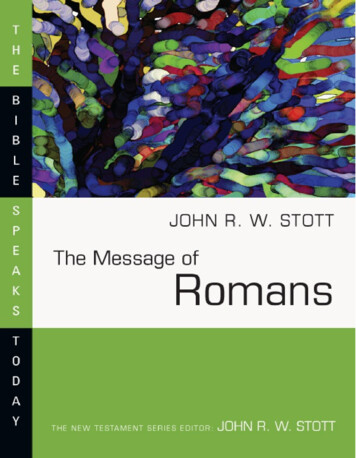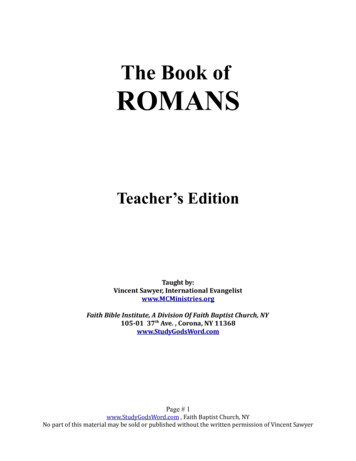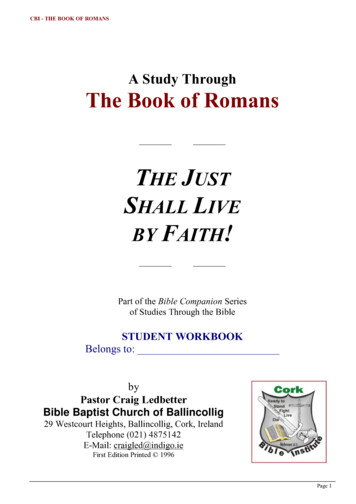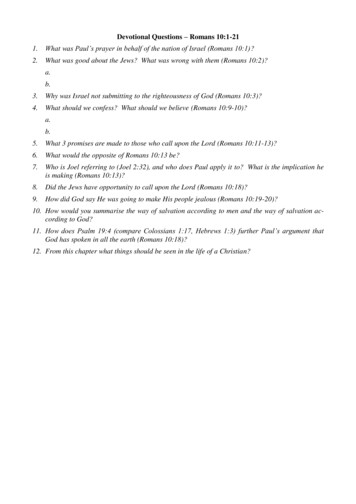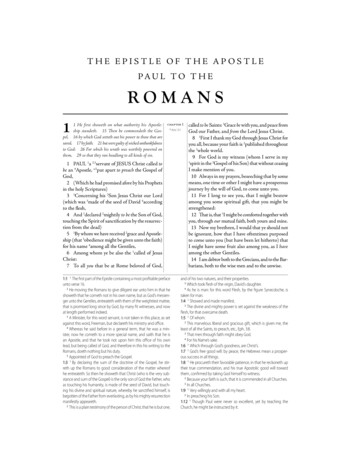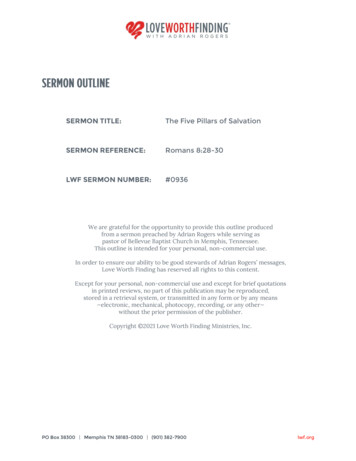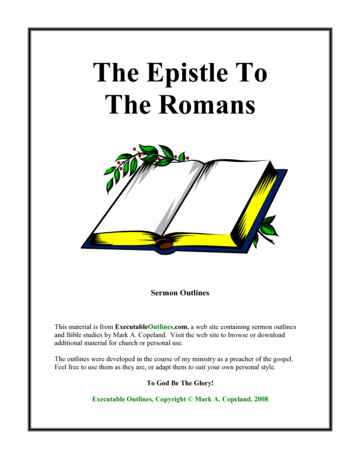
Transcription
The Epistle ToThe RomansSermon OutlinesThis material is from ExecutableOutlines.com, a web site containing sermon outlinesand Bible studies by Mark A. Copeland. Visit the web site to browse or downloadadditional material for church or personal use.The outlines were developed in the course of my ministry as a preacher of the gospel.Feel free to use them as they are, or adapt them to suit your own personal style.To God Be The Glory!Executable Outlines, Copyright Mark A. Copeland, 2008
Mark A. CopelandThe Epistle To The RomansTable Of ContentsCalled To Be Saints (1:7)Finding A Way In The Will Of God (1:10)Not Ashamed Of The Gospel (1:14-17)The Wrath Of God (1:18-32)The Goodness Of God (2:4-11)The Righteousness Of God Revealed (3:21-31)Shall We Continue In Sin? (6:1-23)God’s Gift Of Eternal Life (6:22-23)Two Dilemmas (7:14-25)Freedom From Sin (8:1-25)Do Not Be Conformed To This World (12:1-2)Be Transformed (12:1-2)Finding Our Function In The Body (12:3-8)A Love That Can Hate (12:9-10)An Exhortation To Diligent Service (12:11)The Key To A Joyful, Productive Life (12:12)Benevolence To Saints And Strangers (12:13)To Bless And Curse Not (12:14)The Empathetic Christian (12:15)The Renewed Mind (12:16)Responding To Evil (12:17-21)The Christian’s Duty To Government (13:1-7)Indebted To Love (13:8-10)It’s Time To Wake Up! (13:11-14)Admonitions To Strong And Weak Brethren (14:1-15:7)The Epistle To The 0732
Mark A. CopelandCalled To Be SaintsRomans 1:7INTRODUCTION1. In his epistle to the Romans, Paul said he was “called to be an apostle” - Ro 1:1a. I.e., he was summoned to be an apostle, one sent by Jesus for a special purposeb. That purpose involved the gospel, which Paul was sent to proclaim to the nations - Ro 1:1,52. All Christians likewise have their “calling”.a. We are the “called of Jesus Christ” - Ro 1:6b. We are “called to be saints” - Ro 1:73. The term “saint” is frequently misunderstood and misapplied.a. One might get the wrong impression of what Paul is sayingb. A proper understanding is important, serving as motivation for proper conduct[So let us ask our first question: What is a “saint”.?]I. THE DEFINITION OF A SAINTA. ONE SET APART, CONSECRATED, HOLY ONE.1. “The word mean set apart, consecrated, sacred.In the NT the word hagios, when used asa noun, usually refers to members of the.church. All believers are called ‘saints,’ evenwhen their character is dubiously holy.” - Zondervan Pictorial Encyclopedia2. “A NT believer, belonging exclusively to God. The saints are the church, people called outof the world to be God’s own people.” - Zondervan Topical Bible3. “Set apart for God, to be, as it were, exclusively His.this appellation is very often in theNT transferred to Christians, as those whom God has selected out of the world” - Thayer4. “It is used of men and things in so far as they are devoted to God. These are called hagoi,saints, i.e., ‘sanctified’ or ‘holy ones.’ This sainthood is not an attainment, it is a state intowhich God in grace calls men” - VineB. APPLIED TO ALL CHRISTIANS.1. Summarizing what these sources say, a “saint” is:a. A Christian, a member of the body of Christb. As such, Christians are considered by God to be.1) Set apart, holy2) Consecrated for His purpose2. A quick survey of the NT confirms this definition and use of the term “saint”a. Addressing those in various congregations - Ro 1:7; 1 Co 1:2; 2 Co 1:1; Ep 1:1;Ph 1:1; Co 1:2b. Describing the subjects of brotherly love - Ep 1:15; Co 1:4; Phe 4-73. A “saint” is not some super-spiritual Christian.a. Now dead and having lived a long time agob. Who is canonized and venerated as an object of worship-- Indeed, every Christian is a saint!The Epistle To The Romans3
Mark A. Copeland[However, we find both now and then that not all Christians behave like saints. This raises the question:How should saints live.?]II. THE LIFE OF A SAINTA. AS DESCRIBED IN EPHESIANS.1. Saints should live in a manner worthy of their calling - Ep 4:1a. Walking in unity - cf. Ep 4:1-16b. Walking in truth - cf. Ep 4:17-32c. Walking in love - cf. Ep 5:1-7d. Walking in light - cf. Ep 5:8-14e. Walking in wisdom - cf. Ep 5:15-172. Saints should avoid things not befitting their calling - Ep 5:3-4a. Fornication, uncleanness, covetousnessb. Filthiness, foolish talking, coarse jesting-- Saints strive to live this way; they do not always live up to their callingB. AS DESCRIBED IN COLOSSIANS.1. Saints should be filled with the knowledge of God’s will - Co 1:9a. Involves a good knowledge of the Bibleb. Accompanied by wisdom and understanding (via prayer - Ja 1:5)2. Saints are to walk worthy of the Lord - Co 1:10a. We are called to be Christians as well as saints - cf. Ac 11:26b. Our behavior should properly reflect the One whose name we wear!3. Saints are to fully please Him - Co 1:10a. By being fruitful in every good workb. By increasing in the knowledge of God4. Saints are to be strengthened with all might - Co 1:11a. According to God’s glorious power - cf. Ep 3:16,20; 6:10,13b. For all patience and longsuffering with joy5. Saints are to give thanks to the Father - Co 1:12-14a. He has qualified us to be partakers of the inheritance of saintsb. He has delivered us from the power of darknessc. He has conveyed us into the kingdom of the Son of His loved. He has provided redemption and forgiveness of sins, through His Son’s blood-- The epistles were written to saints; from them we learn how saints ought to live![We noted that one reason saints are to be thankful is because God has qualified us to partakers of “theinheritance of the saints”. This raises a third question: What is the hope of saints.?]III. THE HOPE OF A SAINTA. RICH AND GLORIOUS.1. Which Paul wanted the saints at Ephesus to know - Ep 1:182. Which involves the exceeding riches of God’s grace - Ep 2:73. Which is presently reserved in heaven for us - 1 Pe 1:4-- Paul and Peter describe our inheritance in general termsThe Epistle To The Romans4
Mark A. CopelandB. NEW HEAVENS AND A NEW EARTH.1. Promised by God, anticipated by Peter - 2 Pe 3:13-14a. A future realm in which righteousness dwellsb. Motivating us to live now in peace, without spot and blameless2. Revealed by Jesus, described by John - Re 21:1-7a. Replacing the present earth and universeb. Involving the holy city, New Jerusalem, coming down out of heavenc. In which God will dwell with men, providing wonderful blessings-- Peter and John describe our inheritance in figurative terms[Questions may remain as to the ultimate nature of the saints’ inheritance, but enough is revealed tomotivate us to become saints and live in a manner worthy of our calling. This leads to our fourth andfinal question: How do we become saints.?]IV. THE BEGINNING OF A SAINTA. CALLED BY THE GOSPEL.1. We become saints by being “called” - cf. Ro 1:7a. The idea of being “called” is one of being “summoned”b. But we are not called or summoned by a small still voice, or bolt of lightning2. We are “called” by the gospel - 2 Th 2:14a. God calls people by the gospelb. For the obtaining of the glory of our LordB. PRODUCED BY THE GOSPEL.1. The gospel reveals God’s plan for saving man from his sinsa. With facts to believe - e.g., 1 Co 15:1-3b. With commands to obey - e.g., Mk 16:16; Ro 10:9,10c. With promises to receive - e.g., Ac 2:38-39; Ro 6:232. When people respond, they become saintsa. Saved and called by the grace of God - 1 Ti 1:9b. Even though sinners, as were the saints in Corinth - 1 Co 1:2; 6:9-113. Every time the gospel is preached, God is calling people to become saintsa. Those who hear are exhorted to obeyb. Those who obey are washed, sanctified, justifiedc. Those who are sanctified are set apart, consecrated for God’s purpose; i.e., saintsCONCLUSION1. By the wonderful grace of God.a. We can be His saints, His holy ones, set apart for His purpose!b. We can look forward to the wonderful inheritance reserved in heaven for us!2. Yet as saints, we must walk in a manner worthy of our calling.a. We must make our “calling and election sure” - 2 Pe 1:10-11b. Even Paul, called both as an “apostle” and a “saint”, realized the risk of his being rejected afterpreaching to others - 1 Co 9:27The Epistle To The Romans5
Mark A. CopelandAre you a saint? You are if you have responded to the call of God through obedience to the gospel! Areyou living as a saint should? May the hope of saints motivate you to walk worthy of your calling!The Epistle To The Romans6
Mark A. CopelandFinding A Way In The Will Of GodRomans 1:10INTRODUCTION1. “What is God’s will for my life?”a. What devout person has not asked a question like this?b. Often asked even pertaining to mundane things like one’s career, where to live, etc.-- How can we live in harmony with the will of God?2. Paul mentioned his desire to live in harmony with God’s will.a. As he made plans to visit his brethren in Romeb. As he prayed regarding such plans - cf. Ro 1:9-10-- He sought to “find a way in the will of God” to come to them[Paul’s comments provide an opportunity for us to consider some thoughts related to the will of God,especially on how to determine God’s will for our lives. It might be of benefit to first review some.]I. FACETS OF GOD’S WILLA. THERE IS GOD’S PROCLAIMED WILL.1. God has made His will known in many respects - e.g., 1 Th 5:18; 1 Pe 2:152. This He has done through revelationa. By sending inspired prophets in the past - He 1:1b. By sending His own Son - He 1:2c. By having the Spirit guide the apostles - Jn 16:12-13; e.g., 1 Co 14:36-373. It is this proclaimed will of God that we must do to be saved - cf. Mt 7:21-- That which is essential to know, God has revealed through Scripture - 2 Ti 3:16-17B. THERE IS GOD’S PROVIDENTIAL WILL.1. God acts providentially in our lives, as implied in our text - cf. Ro 1:10; also 15:322. For such reason we are to pray regarding our plans - cf. Ja 4:13-153. Our requests are answered as it may suit God’s will - cf. 1 Jn 5:14-- We may not have certainty as to what is God’s providential will for usC. THERE IS GOD’S PERMISSIVE WILL.1. God allows things to happen that are not necessarily according to His desired will2. He permits people to sin and even hurt other peoplea. He is not pleased, and will one day render judgment - Ac 17:30-31b. He is able to fulfill His own will, despite such rebellion - cf. Isa 10:5-73. God permits people to do things that are indifferent to Hima. There are some matters of indifference to God - e.g., Ro 14:5-6b. Likewise, some decisions we make might not really matter to God-- Thus not all choices please God, nor are they necessarily required by God[With these thoughts in mind, let’s now consider some thoughts on.]II. FINDING GOD’S WILLThe Epistle To The Romans7
Mark A. CopelandA. FOCUS ON THE PROCLAIMED WILL OF GOD.1. I.e., study diligently to learn what God has revealeda. If you don’t embrace and practice the revealed will of God.b. .what difference does it make to seek areas of God’s will unknown to you?2. The value of focusing on the proclaimed will of Goda. We will not be ignorant of what is essential for us to know and dob. We can avoid choices that are clearly contrary to God’s willB. SEEK ADVICE FROM OTHERS.1. Discuss your alternatives with older, mature Christians - Pro 11:14; 12:152. Consult the wisdom found in the Bible (especially in books like Proverbs, Ecclesiastes)C. ASK GOD FOR WISDOM.1. I.e., pray diligently for the ability to discern wisely - Ja 1:5-82. Wisdom is that spiritual insight that enables you to evaluate situations clearly, and helpsutilize what options and abilities you have3. Use such wisdom to eliminate what appears less acceptableD. COMMIT YOUR WAY TO THE LORD.1. Whatever you do, do it for the Lord’s sake - cf. Psa 37:5-6,23-262. Make your plans subject to God’s will, both proclaimed and providential - Ja 4:15a. Give God permission to close the door on your choice if that is His willb. If He closes the door on your choice, look for alternativesE. OTHER THINGS TO REMEMBER.1. God is not like a train; he is able to run on more than one track2. A choice may not be between good and bad, but between good and better3. God can use us in many different ways4. If need not choose right away, wait; that will give you time to grow and gain wisdom5. Whatever your hands finds to do in your existing circumstances, do it with all your mightCONCLUSION1. Our goal should be to “stand perfect and complete in all the will of God” - cf. Co 4:12a. Especially as it pertains to the proclaimed will of Godb. Even as much as possible in the providential and permissive will of God2. Epaphras’ desire for his brethren serves as a good example; as does that of our Lord.a. Who taught us to pray, “Your will be done on earth as it in heaven” - Mt 6:10b. Who Himself prayed, “Not as I will, but as You will.” - Mt 26:39-42Are you seeking to “find a way in the will of God” as it pertains to the plans in your life?The Epistle To The Romans8
Mark A. CopelandNot Ashamed Of The GospelRomans 1:14-17INTRODUCTION1. As Paul began his grand epistle to the Romans, he wrote of his desire to see them.a. His diligent prayers toward that end - Ro 1:9-10b. His desire to encourage them through mutual edification - Ro 1:11-12c. His plans to come, that he might have some fruit among them - Ro 1:132. His desire to see them was related to the gospel.a. Which he served as an apostle of Christ - Ro 1:1b. The good news concerning Jesus - Ro 1:3c. Of which he was not ashamed - Ro 1:163. Are we ever ashamed of the gospel of Christ.?a. Embarrassed to tell others about Jesus?b. Could this be a reason why many are not active in personal evangelism?[Perhaps by examining how and why Paul was not ashamed of the gospel, we might be more diligent inour efforts to share the good news of Jesus Christ.]I. PAUL WAS NOT ASHAMED OF THE GOSPELA. HOW HE WAS NOT ASHAMED.1. He felt obligated to preach the gospel to everyonea. To Greeks and barbarians (non-Greeks), to wise and unwise - Ro 1:14b. His obligation due partly to favor God had shown him - 1 Co 15:9-10; 1 Ti 1:12-142. He was ready to preach the gospel in Romea. Whatever opportunity was given him, he would take it! - Ro 1:15b. Even though his preference was to preach where Jesus had not been proclaimed before- Ro 15:20-- Paul showed that he was not ashamed by his willingness and preparedness topreach the gospel anytime and anywhere!B. WHY HE WAS NOT ASHAMED.1. It is the power of God to salvationa. For everyone who believes, both Jew and Greek (Gentiles) - Ro 1:16b. For it tells of Christ, the power of God and wisdom of God - 1 Co 1:23-242. It reveals the righteousness of God in salvationa. How the just shall live by faith - Ro 1:17b. How God is both just and the justifier of those who believe in Jesus - Ro 3:21-26-- Because of its power and message, Paul was not ashamed to preach the gospel toanyone willing to listen![From Paul, then, we should note several reasons why.]The Epistle To The Romans9
Mark A. CopelandII. WE SHOULD NOT BE ASHAMED OF THE GOSPELA. THE GOSPEL REMAINS THE SAME.1. It is still God’s power to savea. The power to produce faith in the hearts of those who hear it - Ro 10:17b. The power to produce fruit in those who hear and know the truth - Co 1:5-62. It still reveals God’s righteousness in salvationa. How Jesus died for our sins - 1 Co 15:1-4b. How we can receive remission of our sins in Jesus through faith, repentance, andbaptism - Ac 2:36-38; 22:16-- The passing of time has not weakened the power and message of the gospel ofChrist!B. THE NEED REMAINS THE SAME.1. Souls are in need of salvationa. All have sinned - Ro 3:23b. The wages of sin is death - Ro 6:232. Both wise and foolish, both near and afara. Jesus is still the only way to the Father - Jn 14:6b. His gospel still needs to be preached to every creature - Mk 16:15-16-- The passing of time has not lessened the need and scope of the gospel of Christ![From the example of Paul, we can know the proper attitude and conduct of.]III. THOSE NOT ASHAMED OF THE GOSPELA. WILL FEEL A SENSE OF OBLIGATION.1. To God who saved thema. Are we not thankful for what God has done for us?b. Will this not affect how we live our lives? - cf. Ga 2:202. To those who are losta. Are we not concerned about their eternal destiny should they die in their sins?b. Will this not move us to do something? - cf. 2 Co 5:11-- Those not ashamed of the gospel will feel an obligation similar to Paul’s - Ro 1:14B. WILL MAKE THEMSELVES READY.1. To share the gospel as they have opportunitya. If uncertain what to say, they will learn it (even relearn it) - cf. 1 Pe 3:15; He 5:12b. They will not rest until they have found some method, aids, or tools, whereby they cancommunicate the gospel to othersc. Then they will be looking for “open doors” to teach others - cf. 1 Co 3:52. To spread the gospel as they have opportunitya. They may not be in a position to go, but they can still send - cf. Ro 10:14-15; 3 Jn 5-8b. They may not be in a position to teach, but they can still invite - e.g., Ac 10:24,33c. Then they will be looking for “open doors” to send - e.g., Ph 4:15-16-- Those not ashamed of the gospel will make themselves ready like Paul - Ro 1:15CONCLUSIONThe Epistle To The Romans10
Mark A. Copeland1. Are you ashamed of the gospel of Christ? You may be, if you are not.a. Doing anything to share the gospel yourselfb. Involved in helping others to spread the gospel2. You have no reason to be ashamed, it is still the same gospel!a. With power to save the souls of menb. Revealing the wonderful righteousness of God to save menMay we never be ashamed of the gospel, or of Jesus Himself.“For whoever is ashamed of Me and My words in this adulterous and sinfulgeneration, of him the Son of Man also will be ashamed when He comes in the glory ofHis Father with the holy angels.” (Mk 8:38)“Yet if anyone suffers as a Christian, let him not be ashamed, but let him glorify Godin this matter.” (1 Pe 4:16)The Epistle To The Romans11
Mark A. CopelandThe Wrath Of GodRomans 1:18-32INTRODUCTION1. The Scriptures speak of the coming day of God’s wrath.a. Revealing the righteous judgment of God - cf. Ro 2:4-6b. A day of judgment of the ungodly - cf. 2 Pe 3:7-- In which the fullness of God’s righteous indignation is made known2. The Scriptures also speak of how God’s wrath has already come.a. Revealed from heaven - Ro 1:18ab. Against all ungodliness and unrighteousness of men - Ro 1:18b-- In which a foretaste of God’s righteous indignation is manifested[Why does God manifest this “foretaste” of His wrath? How does He express His righteous indignationeven now, long before the day of judgment? Our text (Ro 1:18-32) provides the answers.]I. WHY GOD MANIFESTS HIS WRATHA. BECAUSE MAN STIFLES GOD’S REVEALED TRUTH.1. By suppressing the truth in unrighteousness - Ro 1:18a. Rejecting what is trueb. Justifying what is ungodly and unrighteous2. By spurning what God has revealed - Ro 1:19-20a. Things about God that are manifest in man himself1) E.g., man’s intelligence and personality, implying the same of his Creator2) E.g., man’s sense of ought, implying a righteous Creatorb. Things about God that are manifest in creation around him - cf. Psa 19:1-21) Invisible attributes of God, seen and understood by things that are visible2) E.g., design and order of the universe imply eternal power and Deity-- When man fails to listen to the beauty and design of the universe that declares“God exists!”, God is angry!B. BECAUSE MAN IS UNGRATEFUL AND FOOLISH.1. Not being thankful to God - Ro 1:21aa. Even when they knew Himb. Yet failing to glorify Him as God2. Becoming futile in their thoughts and foolish in their hearts - Ro 1:21b-23a. The consequence of not glorifying Godb. Leading to idolatry (the worship of creation instead of the Creator)1) E.g., making God into their own image2) E.g., making God into the image of other animate objectsc. Modern man has his own idols:1) E.g., secular humanism (worshipping self)2) E.g., covetousness (worshipping money) - cf. Ep 5:5; Co 3:5-- When man ceases to be thankful to God, and esteems created things over Him,The Epistle To The Romans12
Mark A. Copelandthen God is angry![The wrath of God at the last day will involve a fiery end (cf. 2 Pe 3:10; 2 Th 1:7-9). God’s wrathbeing revealed today is more subtle, but terrible nonetheless.]II. HOW GOD MANIFESTS HIS WRATHA. HE “GIVES MAN UP” TO MORAL UNCLEANNESS.1. God “gave them up” (paradidomi) - Ro 1:24aa. No fire from heaven striking them downb. But simply leaving man to his own desires2. To (moral) uncleanness - Ro 1:24ba. In the lusts of their hearts (wherever their wicked hearts led them, cf. Mk 7:21-23)b. Dishonoring their bodies among themselves (in what way, see below)3. Why? Because they exchanged the truth of God for the lie - Ro 1:25a. Worshipping and serving that which is createdb. Rather than He who is the Creator and worthy to be blessed foreverB. HE “GIVES MAN UP” TO VILE PASSIONS.1. Again, God “gave them up” (paradidomi) - Ro 1:26aa. No lightning from heaven striking one downb. But simply leaving man to his vile passions2. Case in point, lesbianism - Ro 1:26ba. Women exchanging the natural use for what is against natureb. Using bodies designed for procreation in ways that do not procreate3. Case in point, homosexuality - Ro 1:27a. Leaving the natural use of women (to procreate, to avoid fornication, cf. 1 Co 7:2)b. Burning in their lust for one another, committing with men what is shamefulc. Receiving in themselves the penalty of their error which was due (e.g., AIDS?)C. HE “GIVES MAN UP” TO DEBASED MINDS AND UNRIGHTEOUSNESS.1. Yet again, God “gave them over” (paradidomi) - Ro 1:28a. Since they did not like to retain God in their knowledgeb. God gave them over to a debased mind, to do things not fitting2. The result of being “given up”: being filled with all unrighteousness - Ro 1:29-31a. Wickedness, covetousness, maliciousnessb. Envy, murder, strife, deceit, evil-mindednessc. Whisperers, backbiters, haters of Godd. Violent, proud, boasters, inventors of evil things, disobedient to parentse. Undiscerning, untrustworthy, unloving, unforgiving, unmerciful3. They know the righteous judgment of God, that such are deserving of death - Ro 1:32a. Yet they still do itb. And they approve those who do itCONCLUSION1. God’s wrath is manifested today by simply allowing man to go his own way.a. To follow the desires of his heartb. To follow the passions of his lustsThe Epistle To The Romans13
Mark A. Copeland-- Stumbling in blind ignorance to increasing degrees of depravity - cf. Ep 4:17-192. God’s mercy is manifested today for those willing to turn back to Him.a. Willing to acknowledge His revelation1) That given through creation2) Even more so that given through His Son! - cf. 1 Jn 4:9,10b. Willing to be thankful to Him1) With the attitude of gratitude - cf. Co 1:12; 2:7; 3:15,17; 4:22) Showing gratitude through repentance - cf. Ro 2:4Are we thankful? Do we show it by turning from our sins and turning to God? If not, we have everyreason to fear the wrath of God - not just the day of judgment, but the consequence in this life of Godsimply “giving us up” to our own desires!The Epistle To The Romans14
Mark A. CopelandThe Goodness Of GodRomans 2:4-11INTRODUCTION1. Many people live their lives with little regard to the goodness of God.a. Unaware of how gracious God has been and is willing to be toward themb. Unaware of how their neglect will one day come back to haunt them2. Have you given much thought to the goodness of God.?a. The many blessings He bestows?b. The consequences if you fail to respond properly?[One passage of Scripture that ought to give us pause is the one written in Ro 2:4-11, in which Paulexpounds upon “The Goodness Of God.” From verse 4, we can glean some things about.]I. THE NATURE OF HIS GOODNESSA. HIS RICHES.1. He is rich in grace - Ep 1:72. He is rich in mercy - Ep 2:43. He is rich in supplying need - Ph 4:194. He is rich in giving things to enjoy - 1 Ti 6:175. He is rich in the strength He provides the Christian - Ep 3:16,21B. HIS FORBEARANCE.1. “Forbearance” (anoche) means “a holding back” - ISBE2. We see God’s forbearance.a. In the days of Israel - cf. Psa 78:38b. In our present day (since the fullness of God’s wrath has yet to come)C. HIS LONGSUFFERING.1. “Longsuffering” (makrothumia) describes “a slowness in avenging wrath” - Strong’s2. We see God suffering long.a. In the days of Noah, prior to the flood - cf. 1 Pe 3:20b. In our present day, prior to the day of judgment - cf. 2 Pe 3:9-15a[The Psalmist summarizes well the nature of God’s goodness: “But You, O Lord, are a God full ofcompassion, and gracious, Longsuffering and abundant in mercy and truth.” (Psa 86:15). As wereturn to our text in Romans, we are told of.]II. THE PURPOSE OF HIS GOODNESSA. SHOULD LEAD ONE TO REPENTANCE.1. God’s goodness is intended to cause man to repent - Ro 2:42. Based on Paul’s description of repentance elsewhere, God’s goodness should produce.a. Godly sorrow which leads to repentance - cf. 2 Co 7:9-10The Epistle To The Romans15
Mark A. Copelandb. A change of mind (the actual meaning of metanoia, repentance) - Strong’sc. A turn from sin to God (as evidence of repentance) - cf. 2 Co 7:10-11B. SHOULD LEAD ONE TO DO WHAT IS GOOD.1. As just described, an indication of true repentance - cf. 2 Co 7:112. As later described in our text, it should lead to doing good.a. With patient continuance - Ro 2:7a1) Where God was longsuffering (makrothumia) before2) We are to do good patiently (hupomone) now - cf. Lk 8:15b. Seeking glory, honor, immortality - Ro 2:7b1) Glory and honor that will come at the revelation of Jesus Christ - cf. 1 Pe 1:7; 2 Co4:16-182) Immortality (incorruption) that will be given at the same time - 1 Co 15:51-54[Thus “eternal life” will be given to those who are properly motivated by God’s goodness to repent anddo good (Ro 2:7). But what of those who spurn the riches of God’s goodness.?]III. THE REJECTION OF HIS GOODNESSA. INDICATIVE OF A HARD HEART.1. For they despise God’s goodness - Ro 2:42. For they evidently are insensitive and unappreciative of God’s goodness - Ro 2:53. For they remain impenitent in their heart - Ro 2:5B. STORES UP WRATH FOR THE DAY OF JUDGMENT.1. The wrath of God’s righteous judgment - cf. Ro 2:52. A day of wrath involving indignation, tribulation, and anguish - Ro 2:8-9a3. A vivid description of which is found in 2 Th 1:7-9CONCLUSION1. Such is the end of one who does not properly respond to God’s goodness.a. Especially as that manifested through the gospel of Jesusb. Which Paul will expound upon later in this epistle to the Romans2. As we close, be careful to note: there is no partiality with God! - Ro 2:9-11a. Those who do evil will be punishedb. Those who do good will be blessedHave you allowed “The Goodness Of God” to lead you to repentance, especially that repentance calledfor in the proclamation of the gospel? - cf. Ac 2:36-39; 3:19; 17:30-31The Epistle To The Romans16
Mark A. CopelandThe Righteousness Of God RevealedRomans 3:21-31INTRODUCTION1. A major theme in the book of Romans is the righteousness of God.a. It is mentioned in connection with the gospel of Christ - Ro 1:16-17b. It is the major subject of discussion in chapters 1-112. The phrase “righteousness of God” can be understood in two ways.a. God’s own personal righteousness (i.e., His justice)b. God’s system of making man righteous (i.e., forgiving man of sin)-- Both concepts are addressed in the book of Romans, but the latter in particular3. In chapters 1-3, Paul describes man’s need for righteousness.a. How the Gentiles are in need of salvation - Ro 1:18-2:16b. How the Jews are in need of salvation - Ro 2:17-3:20-- Concluding that all the world is guilty, even Israel who had the Law - Ro 3:19-20[But now in our text (Ro 3:21-31), Paul explains how the righteousness of God has been revealed. Itwas revealed in part even.]I. BY THE LAW AND THE PROPHETSA. RIGHTEOUSNESS APART FROM LAW.1. “A righteousness that does not spring from perfect obedience to law “ - B. W. Johnson2. “In a way different from personal obedience to the law.” - Barnesa. “It does not mean that God abandoned his law; or that Jesus Christ did not regard thelaw, for he came to “magnify” it, (Isa 42:21) or that sinners after they are justified haveno regard to the law;” - Barnesb. “But it means simply what the apostle had been endeavoring to show, that justificationcould not be accomplished by personal obedience to any law of Jew or Gentile, andthat it must be accomplished in some other way.” - Barnes-- I.e., a system of justification that does not depend upon one’s perfect obedienceB. WITNESSED BY THE LAW.1. How? Through shadows and figures (e.g., animal sacrifices) - He 10:1-4a. The need for animal sacrifices showed that man’s perfect obedience was inadequateb. Of course, animal sacrifices themselves were not adequate, but a shadow2. How? Through prophetic utterances - Gen 15:6; Isa 53:4-6,10-12; Hab 2:4a. E.g., that Abraham’s faith was reckoned for righteousnessb. E.g., that suffering Servant would bear our iniquitiesc. E.g., that the just would live by faith-- God’s ultimate system of justification (making one righteous) was attested tothroughout the law and the prophets![But what was witnessed through figures and prophetic utterances has now been fully revealed.]The Epistle To The Romans17
Mark A. CopelandII. BY THE GOSPEL AND THE APOSTLESA. DEMANDS FAITH IN JESUS.1. God’s way of making men righteous requires faith in Jesus Christ - Ro 3:22a. We must believe in Him, or die in our sins - Jn 8:24b. We must believe in Him, if we desire eternal life - Jn 20:30-312. A way of salvation available to all who believe in Jesus - Ro 3:22-23a. There is no differe
The Epistle To The Romans 3 Called To Be Saints Romans 1:7 INTRODUCTION 1. In his epistle to the Romans, Paul said he was “called to be an apostle” - Ro 1:1 a. I.e., he was summoned to be an apostle, one sent by Jesus for a special purpose b. That purpose involved the gospel, whi
